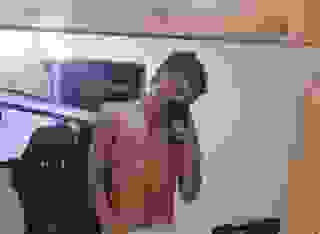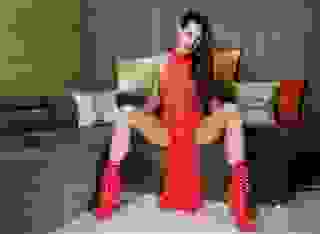Note: You can change font size, font face, and turn on dark mode by clicking the "A" icon tab in the Story Info Box.
You can temporarily switch back to a Classic Literotica® experience during our ongoing public Beta testing. Please consider leaving feedback on issues you experience or suggest improvements.
Click hereHe spoke of the novel he was writing, and I expressed interest in that. He was surprised that I was as glib as I was about creative writing, but it was what I was studying at the university.
"Do you know how to type too?" he asked. He had finished his beer and moved his chair forward, to where he could place his hands on my knees, which he did. Both of us knew we would fuck, but neither of us was in a hurry to get there. We were just enjoying talking about a subject that had nothing to do with where we were and the danger we were in.
"But of course," I said.
"Would you like to become a reader for me--and a typist for the drafts of the novel I'm writing? I have reached the stage where I need logistical help--and a fresh pair of eyes on the novel. Perhaps you could come out to my place for the afternoons."
"Yes, I think I would enjoy that," I responded. "Is that what you want to do now, though?" I looked down at his hands on my knee just under the bottom edge of the towel. He had spread my knees apart and glided his hands along the inner surfaces of my thighs. If he thought that would arouse me, he was quite correct.
"No, that's not what I want now," he murmured, and he reached up, unknotted the towel, and brushed edges off my now-fully naked body. Of course I was in erection. He came down on his knees between my spread thighs, and I reclined back on the bed as he took my cock in his mouth. He took his time, making love to my shaft and balls, as I moaned, arched my back, reached my arms out straight from my body in a sacrificial stance, my fists bunching up wads of the sheeting as the need and release rose inside me, and he eventually took my ejaculation in his throat.
While he was giving me head his fingers were working my anal entrance, opening me up for him, so that, after I came, he merely rose up, hovering over me, put his cock head in position, grasped my ankles, raising and spreading my legs in a V, penetrated, and fucked me slowly to heaven.
Later, after he was gone, I went back to the window to watch the moon hovering over the marina. Once more I saw activity down there. The Italian, Mateo Paoli--I was sure it was Mateo--entered the marina, moving furtively. Did everyone move furtively in Antibes these days, I wondered. But of course they did, I answered myself. I was surprised to see that he entered my cabin cruiser. I wasn't too surprised, though. These days it seemed like he was sending a lot of time on my boat--and with no regard to whether I was there or not. No doubt, I reasoned, he was so drunk from the party that was winding down downstairs that he thought he couldn't make it any further than my boat before collapsing in a drunken stupor to sleep it off.
At least he hadn't gotten into his mind to join the progression of men who were coming to my room this night for solace and comfort from the fears that gripped them. And thinking of that, I knew it was near time that the innkeeper, Maurice Gagnon, would come to spend the night covering me. I remained at the window, watching the yacht basin, waiting for Maurice to come.
But Maurice didn't come that night and, finally, exhausted and spent, I went to the bed, lay down, and went immediately to sleep, dreaming of a slick of oil slowly covering the earth.
* * * *
When I went down to the tables on the porch late the next morning, Maurice wasn't yet in evidence, but Père Bernard was there, and Tristian was serving lunch, although it would be breakfast for me. I joined the priest, who had rarely said anything to me before but who addressed me now.
"You have missed the excitement of the morning," he said. I'm sure he knew what sort of evening I had had, entertaining the men of his group, opening my legs for all comers--which made me wonder why he hadn't fucked me yet. I would let him do so. He was a handsome man and looked fit under that habit he was wearing. And I had no aversion to having sex with men of the cloth. It had been a priest who had deflowered me. But he seemed only to have the hots for Tristian, the waiter.
"What's happened?" I asked.
"It's more what's not happening," Bernard said. "There were raids in the early morning. Some of our group are not accounted for as yet."
"Who?" I asked, fearful of the answer.
"Gunter Achten--and Louis, of course. And the artist, Jean-Paul Jardienne. All cannot be found."
"That's terrible," I said.
"That's life in Antibes at the moment," he said. "Actually, I have been waiting for you to arise. Mark Standish tells me he has invited you to work with him on his novel in the afternoons. True?"
"Yes," I answered.
"I think you should move out to his villa. I think an Englishman and an American together will still be safe for a few weeks here. But you both need to be thinking about moving on. I suggest it would be good for you to gather your things from your boat and I could accompany you to Mark's to ensure you get there safely. I have discussed it with Mark and he agrees."
Somehow it didn't sound like a request, and although the priest was calm in talking to me of this, the direness of the situation here was obvious in what he was saying--and not saying. And if someone would know what conditions were really like here, it would be a local French priest like Père Bernard.
I didn't argue. When I'd done eating, I rose from the table. "I will go to the boat and collect my things," I said. "You will--?"
"I will wait for you here. It's best you not tell anyone you see what you are doing and where you are going."
"I understand." And suddenly I did understand. There were undercurrents here I didn't understand--and there were people I thought I knew here who were something different than I supposed. I worried about Gunter and Jean-Paul and even Louis. I hoped they were OK. I hoped they were still alive. I thought of Maurice then too. I hadn't seen him yet this morning and he hadn't come to my bed the previous night.
I wondered as I walked down to the marina whether Mateo Paoli would still be in the cabin cruiser, sleeping a drunk off. I hoped whatever happened to Gunter and Jean-Paul hadn't happened to him as well.
He wasn't in the boat, but, as I gathered my clothes and a few personal belongings up and dropped a bottle that rolled under the desk that my radio equipment was on, I had new, deeper, more sinister worries forming. I found, affixed to the under surface of the desk, below the array of radio equipment, a microphone, with wires going into the separation of the wood planks in the wall.
My boat had been bugged. My thoughts went back to when I thought the boat had been searched. In addition to that, did someone put in bugs as well? Did someone think I was worthy of keeping track of that way? If so, they must be disappointed, as I had spent very little time on the boat since I'd hooked up with the gay men's club up at Maurice's inn. I hadn't used the radio either. Until and unless I went to sea, I had no one to call--I couldn't even now, at this juncture, say where I planned to go from here.
I left the bug in place and went back to the inn, carrying two duffel bags of my possessions. I told Père Bernard about the bug. He didn't react with surprise.
"You knew about it? You know who put it there, don't you?"
"Yes," he answered, with a sigh. "I suppose you have a right to know--if only so you fully understand how dangerous it is for foreigners like you here now. We checked you out, but we decided you were an innocent. Your boat isn't, though. You didn't encounter the Italian, Mateo Paoli, down there at the boat this morning, did you?"
"No. I saw him go into its last night, but he wasn't there just now."
"Good. You must avoid him from now on. By all means, don't let him know you have moved to Mark's villa."
"You are with the French Resistance, aren't you?" I asked. "Mateo is who you are watching--why the bug is in my boat. I know he spends time there, but why my boat?"
"You have radio equipment in your boat. Paoli has been using it to report back to Italy."
"Who to in Italy?"
"We have no idea, but we wish we did. Perhaps we will."
"And you're just monitoring him? You aren't stopping him?"
"Better the devil you know," Bernard said. "With the bug in the boat--"
"Monitored by Tristian in the boat next to it," I interjected.
He gave me a sharp look. "Yes. With the bug in the boat, we can keep track of what he's reporting. In time he will be stopped. Until then, at least we know who is spying for Italy even if we don't yet know who he reports to there."
"And the others? Is Gunter spying for Germany?"
"No, Gunter is antifascist. We learned he was about to be arrested last night, and he--and Louis--should be in Switzerland now."
"And how did you learn he was about to be taken? This doesn't have anything to do with Jean-Paul or Maurice, does it?"
"Jean-Paul was an informer for the Vichy and perhaps the Germans as well."
"Was? Do you know why you refer to him in the past tense?"
"We won't hear from Jean-Paul anymore. Maurice should be back soon--from a trip part way to the Swiss border, guiding Gunter and Louis onto the right road leading up to Switzerland. But I think that is enough information for you to have--more than enough. It is not safe for you to know even this much. Shall we go to Mark's villa now?"
We left. I was trembling in fear. Had I, in fact, learned too much? The priest had given me a hard look when I showed that I knew Tristian was monitoring my boat from the one next to it. Was this more than the French Resistance could afford for me to know? Were we really on our way to Mark's villa? And what did Mark Standish know about all this? Did he have a role in all of this?
At the door of the inn, the waiter, Tristian, intercepted us and he and Père Bernard conversed, standing a bit away from me. I heard Bernard murmur, "Oui, mon capitaine--Yes, my captain," to the young man. The revelation hit me that it was the young waiter, not either the priest or the innkeeper, who was the leader of this resistance unit. I would not reveal I knew this, of course. That surely would seal my fate.
As the priest pulled two bicycles from the wall outside the inn's door and we distributed my duffel bags between them, I couldn't resist asking, "You and Tristian? Lovers?"
Bernard laughed. "Oh, my no. Tristian is my nephew."
"So, you aren't--"
"Not that I will reveal to any of my flock here. I must be here to support and comfort them despite anything and everything that could befall us here."
So, those nose-to-nose meetings in the shadows of the back corridors of the inn--they hadn't been sexual in nature. Something much deeper, more sinister had been going on here.
I felt so stupid. I also felt more in fear for my life than I ever had felt before. Would I make it to Mark's alive? Would I be safe there even if I made it there?
* * * *
I'll have to say that the next two weeks were the happiest I spent at Antibes, despite everything that happened and the danger that floated just below the surface, never far out of my mind. I lived in splendid isolation at Mark Standish's seaside villa. We worked on his novel during the afternoons, during which I surfaced so much of my interest in writing that I started taking my hand at it too. And I learned quite a bit of the process of writing and editing and rewriting and preparing a manuscript, that all served me well in years to come.
And we set into a routine. Mark would rise before me in the morning--yes, of course, we slept together and engaged in sex throughout the nights--and be off to do whatever he did in the area. I learned not to ask. He'd come back with our food for the next day, though, which was all I needed to know. Père Bernard had told me not to appear in public, to make people forget a young American man was here. Mark was doing what he could to ensure I stayed hidden.
Getting up after Mark left in the morning, I swam in the sea. In the afternoons we worked on the terrace on his book, which dealt with the Antibes in a more festive and amicable time than this and depicted the unraveling of a marriage by a love triangle that only obliquely revealed an affair on the side by the English husband and the male French gardener. It was written in a time when homosexuality could be there, but not explicitly depicted.
I did my own writing a bit later in the morning, and our evenings were spent in Mark reviewing what I wrote and the two of us discussing both that and his writing. My writing technique was improved significantly by these critique sessions.
What we didn't discuss was Mark's background, how he had come to be in Antibes, and what he planned to do from here when the occupation eventually overwhelmed the French Riviera. There was no hiding that we both knew that the Vichy government in the region was only a fig leaf administration and that eventually the Germans and Italians would split the region between them. It would then be untenable for either an Englishman or an American--especially gay ones--to still be here at that time.
Later in the night we, of course, drank and danced, trying to forget what was happening around us--and fucked.
At some point near the end of the first week, I came to realize what I already had suspected--suspected before Père Bernard, who obviously was part of an underground French Resistance movement, had brought me to Mark--that Mark was part of the fabric of the resistance here too. I surmised that he represented the British intelligence interests here. One evening he sent me to the cellar for more wine, and I found that he'd left a door ajar to a small room I hadn't known was there before. That's where he had been keeping an elaborate radio communications center. Mark was reporting to someone just as I knew I was here and not on my boat because the Resistance was monitoring the Italian, Mateo Paoli, reporting back to Italy using the radio equipment on my boat.
Mark was in whatever spying was going on in Antibes, and, by association and cooperating in the use of my cabin cruiser, so was I.
This all came to a head at the end of two idyllic weeks learning that I did, indeed, want to become a writer, that Mark thought I was good at it, and I'd learned so much I needed to in the mechanics of it--more practical experience than I could have attained in a college course.
One early morning, before dawn, we were awakened by a pounding on the villa's kitchen door. Père Bernard had arrived to start us into the next phase of our life.
"Conditions are best for you two to make the run to Morocco today," he said, as we sat around the kitchen table, drinking coffee. "And we have no more need for your boat, Brent, so you are free to escape. We want you to take Mark with you. It's too dangerous for him to stay here and work anymore. I know diesel is precious, but we will help you get what you need for a run to North Africa."
So, that was it. Mark was part of the fabric of their underground work here--probably their current link with London. And, although I was aching to ask what had happened to Mateo Paoli, I didn't dare. If the need for my compromised radio equipment on board my cabin cruiser was no longer needed by the Resistance, I must surmise that Mateo either had fled or no longer existed.
I realized that, after today, my presence and that of Mark's in Antibes no longer will have existed either. I wondered how long it would be for Bernard, Tristian, and Maurice to join the rest of us in nonexistence and that fascist Nazism will have swallowed up the world.
The priest had brought a young woman with him. He said her name was Laura and that her mother was English and her father French. Mark took her away to the basement, leaving Bernard and me alone in the kitchen. I knew then that she was Mark's replacement here, that he was downstairs, showing her the radio equipment. This indeed meant Mark was leaving. I had a brief moment of fear that I had become expendable--that I was destined for a grave in the villa's garden, but then I realized I was still needed--what I apparently had been needed for all along. I had a boat that could make it across the Mediterranean to the African shores, and I could sail it. I was still needed to help Mark escape.
Bernard assured me that someone would be waiting to take us in hand in Morocco and that Mark would handle everything. I could leave it in Mark's hands. I asked if I would be seeing the Spanish general, Juan del Campo, in Tangier, but the priest just smiled at me and put a finger to his lips.
It, indeed, was Tangier where Mark had me sail the boat, and we were, indeed, met by a group of like-minded Englishmen--gay like Mark and me, and, I surmised British intelligence, like Mark. I was never to hear whether Del Campo made it to these shores or what had happened to him, though.
Chapter Two: Too Old for This: Juan del Campo
"I don't want to leave Spain, Diego."
"I know you don't, but it will be better for you--for all of us--if you do for a while. We worry about you. The English have said they will help. This is your chance."
The old Spanish general, Juan del Campo, highly respected for his role in changing Spain into a Republic in 1931 and nominally neutral in the Spanish Civil War concluded five months previously in February 1939--but not really neutral, as might be coming out in the investigations of the victorious Francisco Franco Nationalist government--had been hidden away in the town of Girona, between Barcelona and the French border, supposedly in seclusion for his health, since the Republican defeat.
Diego, his young lover, but also a leader of the Republican communist faction, who was known as El Hurón, The Ferret, both for his physical attributes and his ability to squirm in and out of trouble, had been in hiding with the general. He was too young to understand why the British would be interested in taking Del Campo out of danger as the clouds of fascism descended on Europe, but he was grateful for the possibility of getting one of them beyond the clutches of the vengeful Franco regime claws. The general assumed he would be the focus of Franco's wrath, but Diego thought the Nationalists were looking more for him than for Del Campo. The general was too old to do Franco harm, and his connections had served him through the civil war.
The young man was unaware that Juan del Campo, a Bourbon through his mother, had lived in England when his father was Spanish ambassador to the Court of St James. Two years younger than the man who was to become King George V, Juan had been a childhood playmate of George and his royal siblings. When King George had taken a boat tour of the Mediterranean for his health in 1925, it was Del Campo who had been his travel companion, and the British royals had not forgotten the protection Del Campo had given the Spanish queen, Ena, granddaughter of Queen Victoria through her daughter, Beatrice, in 1931 when the Spanish monarchy was giving over to a Republic.
The British had heard of the increasingly dire straits the old Spanish general was falling under, had located him in Girona, and were sending evacuation help. There was no mention of evacuating Diego, El Hurón, too, but the communist cell leader hadn't expected there to be any help from the British--or anyone else--for him.
As grateful as Del Campo was for the British concern, though, he had wanted to die where he had lived, in Spain. Though he didn't resist the escape effort, it had been Diego who had packed his bags and who stood there now, looking at the man who had been a mentor to him and who he had returned gratitude by giving himself to the old man, who had always had a fetish for beautiful young, submissive men.
"Diego, I don't know if I can--" He was sitting on the foot of his bed, only wrapped in a towel, having just come out of the shower.








